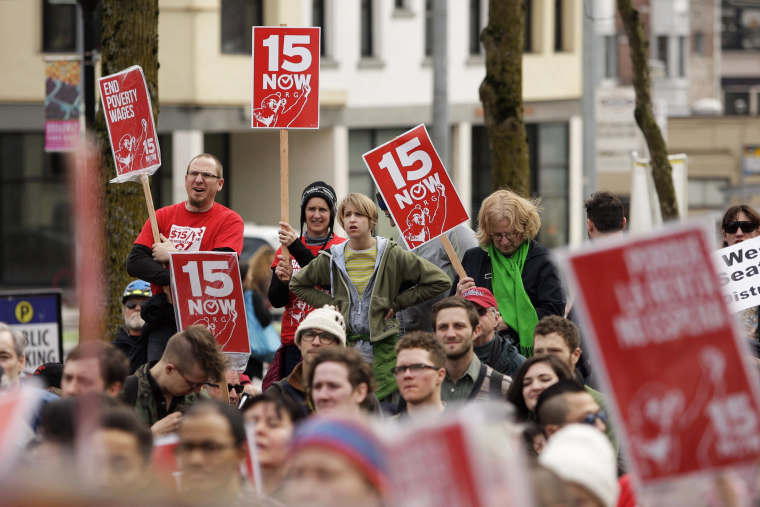The fast food workers movement may have gotten its start in New York City, but Seattle is where it seems closest to realizing one of its key objectives. In over 150 cities, employees of America's largest fast food chains have gone on strike and demanded a base wage of at least $15 per hour; in Seattle, a $15 minimum wage for all workers may soon be a reality.
The city's mayor supports the proposal. Nearly 70% of the city's voters support the proposal. And now that a wage hike looks all but inevitable, Seattle's business community has indicated its support for the proposal—but with a significant catch.
The Greater Seattle Chamber of Commerce and the local branch of the National Restaurant Association (NRA) have joined a coalition of other business groups in calling for a "total compensation" minimum wage law. Under this version of the law, companies would only have to pay their workers the equivalent of $15 per hour in wages and benefits. Tips, health care expenses, job training, transportation stipends and other benefits could all count towards the $15 per hour requirement.
The groups making this proposal have coalesced into a new organization called the OneSeattle Coalition. The stated goal of the coalition, according to a statement on its website, is "to raise minimum compensation to lift people up and encourage businesses to grow and hire."
"OneSeattle is the voice of concerned Seattle employers and community members committed to broadening the circle of prosperity for all Seattleites by promoting sensible, sustainable solutions to address income inequality in a way that creates the greatest good with the least amount of harm," according to a statement from the Washington Restaurant Association, NRA's local branch. "Members are from every sector of Seattle’s diverse community, including minority and neighborhood chambers, non-profit, human services, manufacturing/industrial, GSBA, grocery, retail and, of course, restaurants and hotels."
OneSeattle's minimum wage proposal has drawn vicious rebukes from 15 Now, the activist group leading the charge for a $15 minimum wage. City Council member Kshama Sawant, a self-described socialist and a leader in the 15 Now organization, describes the group as an "astroturf" organization, dominated by big business but designed to look more grassroots.
OneSeattle spokesperson Alex Fryer denied the charge in an email to msnbc.
"[I]t seems hard to argue that 75-100 people can be somehow artificially manufactured but there you go," he wrote in response to a query regarding a recent public meeting of OneSeattle supporters.
But whether OneSeattle is "AstroTurf" or a populist movement of small business owners is less important than the effect its preferred policies would have on low-wage workers. Rebecca Smith, deputy director of the National Employment Law Project, told msnbc the proposal would rob a wage increase of much of its effectiveness.
"You hear employers talking about everything from meals to childcare to bus passes to tips and health care as something they would want to include in wages, and that is unprecedented anywhere in the country," she said. "It really eats away at a $15 minimum wage, at least for some folks. I also think it would be an enforcement nightmare."
Wage theft is highly prevalent among low-wage industries. A 2008 NELP survey of 4,387 workers across the country found that at least 68% had "experienced at least one pay-related violation in the previous work week.” Allowing total compensation to be counted towards wages would make it more difficult to calculate whether employers are obeying the law, said Smith, exacerbating the wage theft epidemic.
"It totally redefines what a wage is," she said.
Fryer said OneSeattle would not let enforcement fall by the wayside if the total compensation proposal was made into law.
"We absolutely believe strong enforcement is key," he said. "There are lots of ideas being discussed right now, including the possible creation of a new City department to monitor labor issues. While these discussions are in the early phases, we look forward to creating a very robust enforcement mechanism."
Seattle is not the only city in the country where a $15 minimum wage appears close to reality. In November, the neighboring town of SeaTac, Wash.—home of the Seattle-Tacoma Airport—approved a referendum favoring the wage hike. Chicago voters overwhelmingly approved a non-binding referendum in favor of the proposal last month, and San Francisco may soon put the $15 minimum wage on its ballot next November.
